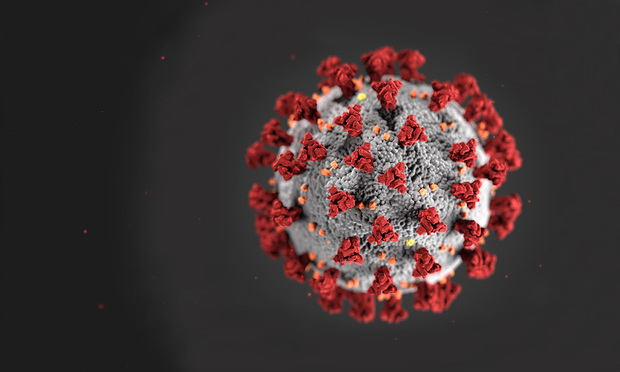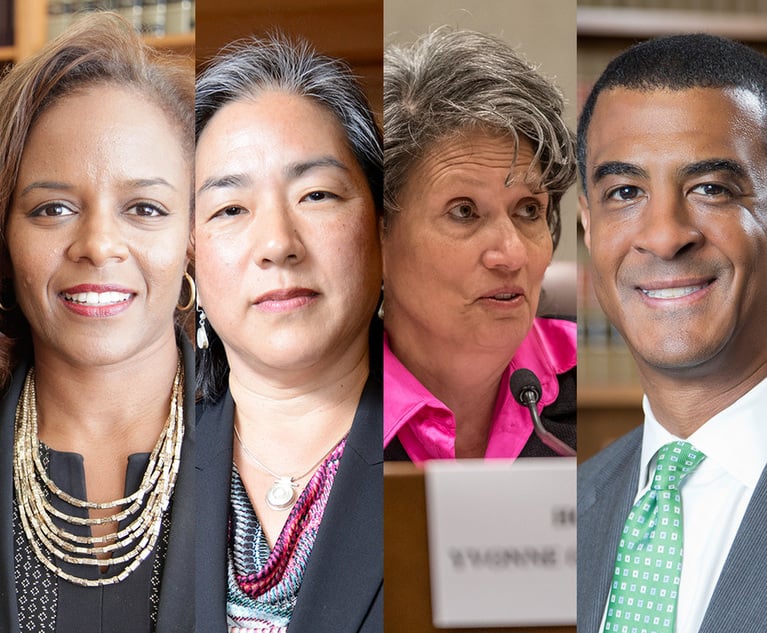Daily Dicta: The Coronavirus Diaries
Creative lawyers have been busy filing a variety of coronavirus-related litigation--though none that addresses the most shameful shortcoming.
March 16, 2020 at 02:15 AM
6 minute read

"Mom, my throat hurts," my 17-year-old daughter told me six days ago, back when the state of the world was alarming but not apocalyptic.
I felt her forehead. A bit warm—99.5, according to the thermometer. Normally, this wouldn't have concerned me in the slightest, but I kept her home from school the next day.
Then the cough started, dry and hacking, keeping her up at night. She said her chest felt tight, but she wasn't having difficulty breathing. Her fever came and went, but it was always low-grade. No stuffy nose, so it didn't exactly seem like a cold. Overall, she felt lousy, but not awful.
 I called her doctor ("Do NOT bring her in," the receptionist said), and was told she wasn't eligible for coronavirus testing.
I called her doctor ("Do NOT bring her in," the receptionist said), and was told she wasn't eligible for coronavirus testing.
So all I could do was worry. About her—though I know coronavirus cases in teenagers are almost invariably mild, if not undetectable—and quite frankly, about me and my husband. Coronavirus cases in our age group are not as mild.
And then … she got better. Over the weekend, her fever and cough went away, though she's still a bit tired. Does this mean she had an unrelated virus? Or is this what COVID-19 looks like in a 17-year-old?
Who knows?
But if she was in fact positive, then I wouldn't have gone to the grocery story on Saturday. And my husband (a lawyer) would not be in court today. Neither of us feels sick—but the virus has a long incubation period. It's impossible to make informed decisions when you don't have information.
Litigation can address many problems—but the shameful shortage of tests doesn't seem to be something it can fix.
That said, creative lawyers have been busy filing a variety of coronavirus-related litigation.
Some suits are almost sure to fail, like a putative class action filed on Friday in Florida's Southern District against the People's Republic of China. Brought on behalf of more or less every person and legal entity in the United States, the suit alleges that the PRC knew the virus "was dangerous and capable of causing a pandemic, yet slowly acted, proverbially put their head in the sand, and/or covered it up for their own economic self-interest."
(Based on that criteria, shouldn't the Trump administration be a co-defendant?)
None of the named plaintiffs in the suit by Boca Raton-based personal injury firm Berman & Berman claims to have contracted COVID-19. Instead, the complaint asserts that they "have or are virtually certain to suffer physical illness or death, as well as emotional distress, and its physical manifestations, from the effects of the outbreak, and other damages."
No doubt that's true—you'd have to be a department store mannequin not to suffer at least some emotional distress these days—but that's not going to get a class certified.
It wasn't the only coronavirus-related class filed last week in Florida. Lawyers from Armas Bertran Pieri sued Amazon in state court for charging "grossly unconscionable" prices for items including toilet paper and hand sanitizer. Florida Governor Ron De Santis declared a state of emergency on March 9, and according to the complaint, it's illegal under the state's Deceptive and Unfair Trade Practices Act to jack up prices after such a declaration.
Name plaintiff Stephanie Armas (whose lawyers include J. Alfredo Armas—relationship unclear) says she paid Amazon $99 for 36 rolls of toilet paper and $199 for two 1-liter bottles of hand sanitizer—items that normally sell for a fraction of the price.
"Unfortunately, retailers, such as the defendants are preying upon the public's fear of a surging epidemic and using COVID-19 as an opportunity to pad profits by way of unlawful price increases," states the complaint filed in the Eleventh Circuit Court in and for Miami-Dade County, Florida.
Another hand sanitizer class action was filed in the Southern District of California targeting Vi-Jon Inc., which makes Germ-X. The plaintiffs claim that the company in ads "affirmatively—and falsely—claims that Germ-X provides 'Coronavirus/Flu Prevention.'"
"[A]s the FDA Warning Letter has confirmed, there are no 'adequate and well-controlled studies' supporting a representation that alcohol-based hand sanitizers produce a clinical reduction in infection or disease of the flu or other viruses," states the complaint by the Kazerouni Law Group.
Wait what? Hand sanitizer is no good? Then why are we paying $100 per bottle for it on Amazon?
Another interesting suit was filed in Utah federal court on Thursday and hastily settled on Saturday before the complaint had even been served.
That was probably a good call by defendant SME Entertainment Group—and by extension, the rock band The Killers (not named in the suit).
The Killers (whose hits include "Somebody Told Me" and "Mr. Brightside") were slated to perform at the X4 Experience Management Summit in Salt Lake City, which is put on by Utah tech firm Qualtrics. About 16,000 people were expected to attend the March 10 – 13 event, with a lineup that also included keynotes by Michelle Obama and Ellen DeGeneres.
Citing the coronavirus, Qualtrics pulled the plug on the event on March 3, announcing that it would be rescheduled for a later date. "The vast majority of the participants and presenters engaged for X4 supported Qualtrics' decision and are working with Qualtrics to reschedule their participation," states the complaint by lawyers from Ray Quinney & Nebeker.
But not The Killers. "SME and The Killers refused to cancel (or postpone) their performance and, instead, insist on full payment, claiming that there is no health risk sufficient to justify cancelation under the agreement," Qualtrics alleged.
No sufficient health risk? Really? I'm pretty sure that's not a winning argument these days.
Qualtrics sued SME seeking declaratory relief. On Saturday, the parties announced the case had settled and "are all pleased that they were able to act in the best interest for the safety of attendees, the fans, and the community."
This content has been archived. It is available through our partners, LexisNexis® and Bloomberg Law.
To view this content, please continue to their sites.
Not a Lexis Subscriber?
Subscribe Now
Not a Bloomberg Law Subscriber?
Subscribe Now
NOT FOR REPRINT
© 2025 ALM Global, LLC, All Rights Reserved. Request academic re-use from www.copyright.com. All other uses, submit a request to [email protected]. For more information visit Asset & Logo Licensing.
You Might Like
View All
‘Listen, Listen, Listen’: Some Practice Tips From Judges in the Oakland Federal Courthouse

Litigators of the Week: A Knockout Blow to Latest FCC Net Neutrality Rules After ‘Loper Bright’

An ‘Indiana Jones Moment’: Mayer Brown’s John Nadolenco and Kelly Kramer on the 10-Year Legal Saga of the Bahia Emerald

Litigators of the Week: A Win for Homeless Veterans On the VA's West LA Campus
Law Firms Mentioned
Trending Stories
- 1Connecticut Movers: New Laterals, Expanding Teams
- 2Eliminating Judicial Exceptions: The Promise of the Patent Eligibility Restoration Act
- 3AI in Legal: Disruptive Potential and Practical Realities
- 4One Court’s Opinion on Successfully Bankruptcy Proofing a Borrower
- 5Making the Case for Workflow Automation
Who Got The Work
J. Brugh Lower of Gibbons has entered an appearance for industrial equipment supplier Devco Corporation in a pending trademark infringement lawsuit. The suit, accusing the defendant of selling knock-off Graco products, was filed Dec. 18 in New Jersey District Court by Rivkin Radler on behalf of Graco Inc. and Graco Minnesota. The case, assigned to U.S. District Judge Zahid N. Quraishi, is 3:24-cv-11294, Graco Inc. et al v. Devco Corporation.
Who Got The Work
Rebecca Maller-Stein and Kent A. Yalowitz of Arnold & Porter Kaye Scholer have entered their appearances for Hanaco Venture Capital and its executives, Lior Prosor and David Frankel, in a pending securities lawsuit. The action, filed on Dec. 24 in New York Southern District Court by Zell, Aron & Co. on behalf of Goldeneye Advisors, accuses the defendants of negligently and fraudulently managing the plaintiff's $1 million investment. The case, assigned to U.S. District Judge Vernon S. Broderick, is 1:24-cv-09918, Goldeneye Advisors, LLC v. Hanaco Venture Capital, Ltd. et al.
Who Got The Work
Attorneys from A&O Shearman has stepped in as defense counsel for Toronto-Dominion Bank and other defendants in a pending securities class action. The suit, filed Dec. 11 in New York Southern District Court by Bleichmar Fonti & Auld, accuses the defendants of concealing the bank's 'pervasive' deficiencies in regards to its compliance with the Bank Secrecy Act and the quality of its anti-money laundering controls. The case, assigned to U.S. District Judge Arun Subramanian, is 1:24-cv-09445, Gonzalez v. The Toronto-Dominion Bank et al.
Who Got The Work
Crown Castle International, a Pennsylvania company providing shared communications infrastructure, has turned to Luke D. Wolf of Gordon Rees Scully Mansukhani to fend off a pending breach-of-contract lawsuit. The court action, filed Nov. 25 in Michigan Eastern District Court by Hooper Hathaway PC on behalf of The Town Residences LLC, accuses Crown Castle of failing to transfer approximately $30,000 in utility payments from T-Mobile in breach of a roof-top lease and assignment agreement. The case, assigned to U.S. District Judge Susan K. Declercq, is 2:24-cv-13131, The Town Residences LLC v. T-Mobile US, Inc. et al.
Who Got The Work
Wilfred P. Coronato and Daniel M. Schwartz of McCarter & English have stepped in as defense counsel to Electrolux Home Products Inc. in a pending product liability lawsuit. The court action, filed Nov. 26 in New York Eastern District Court by Poulos Lopiccolo PC and Nagel Rice LLP on behalf of David Stern, alleges that the defendant's refrigerators’ drawers and shelving repeatedly break and fall apart within months after purchase. The case, assigned to U.S. District Judge Joan M. Azrack, is 2:24-cv-08204, Stern v. Electrolux Home Products, Inc.
Featured Firms
Law Offices of Gary Martin Hays & Associates, P.C.
(470) 294-1674
Law Offices of Mark E. Salomone
(857) 444-6468
Smith & Hassler
(713) 739-1250






